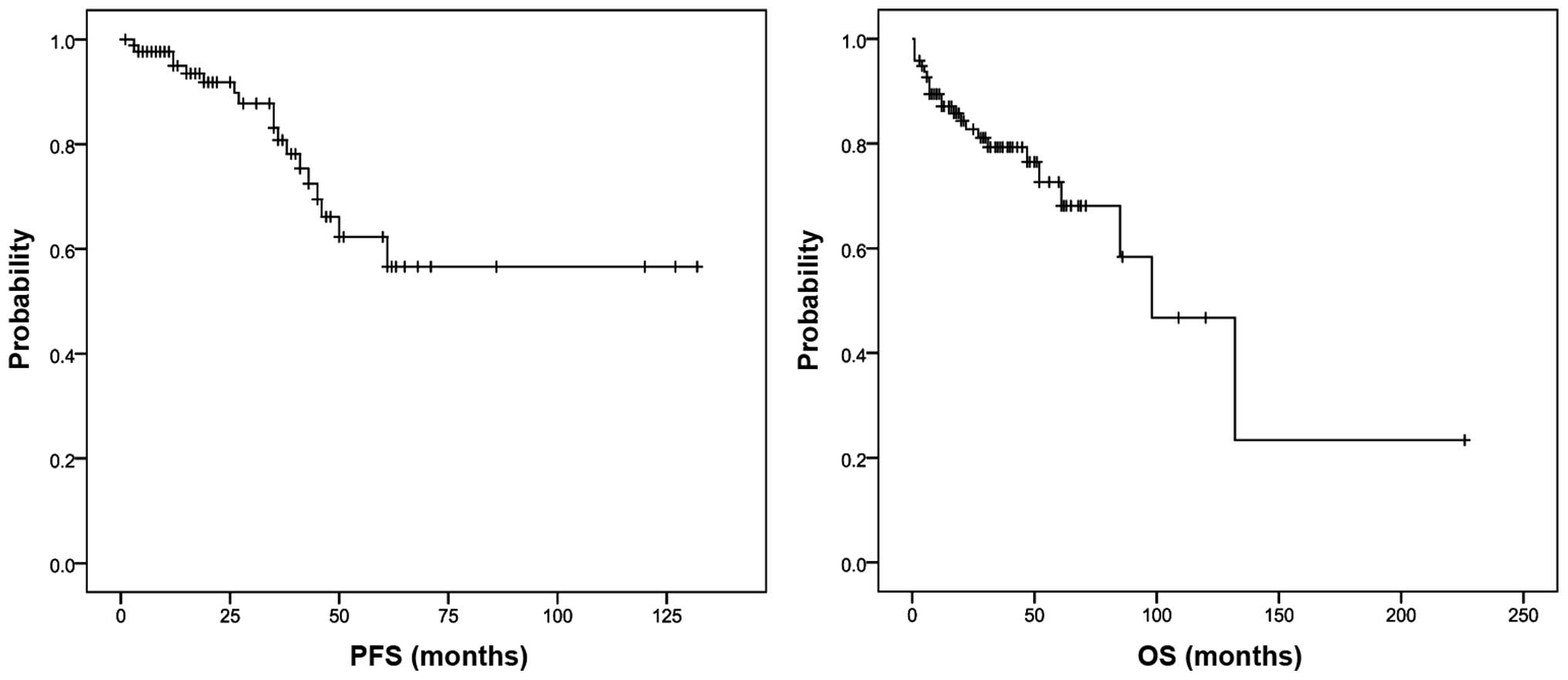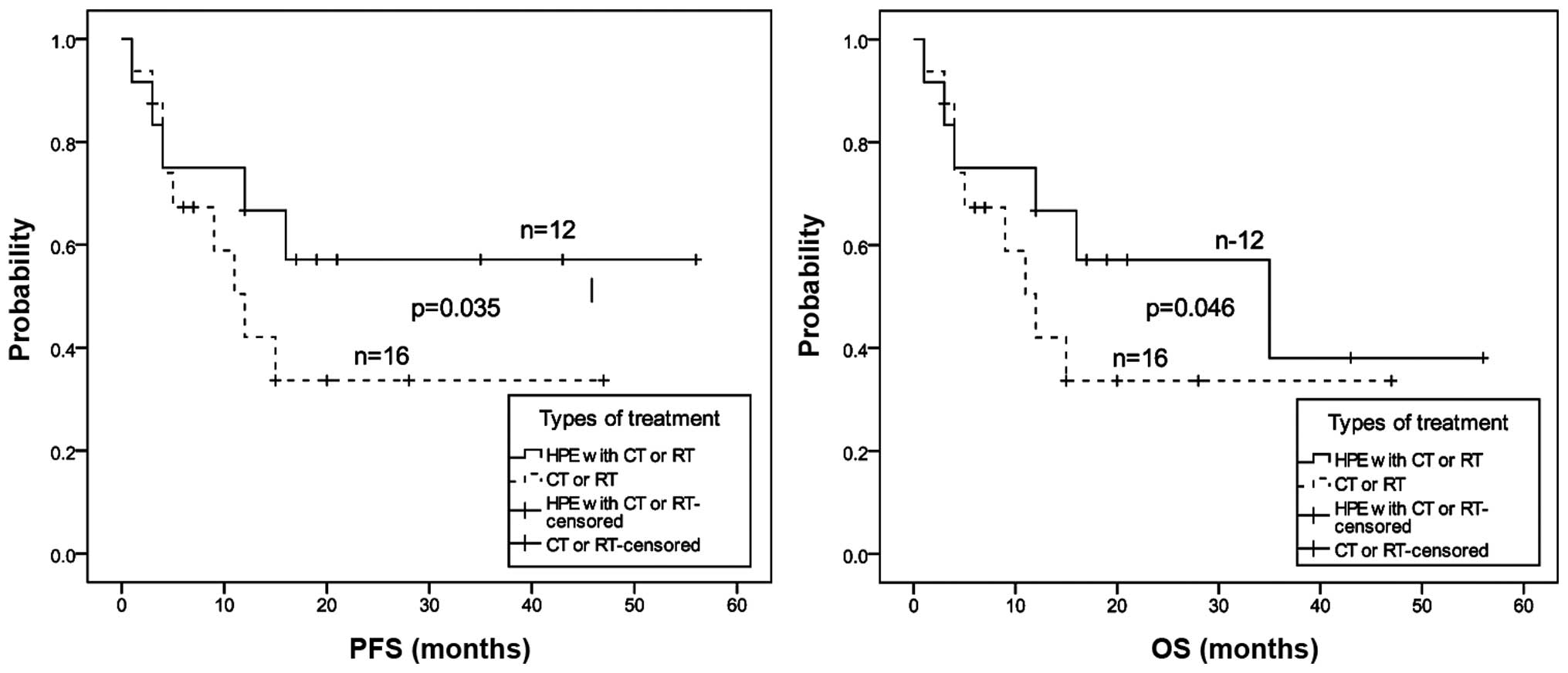|
1
|
Zucca E and Cavalli F: Extranodal
lymphomas. Ann Oncol. 11(Suppl 3): 219–222. 2000. View Article : Google Scholar : PubMed/NCBI
|
|
2
|
Du MQ and Atherton JC: Molecular subtyping
of gastric MALT lymphomas: Implications for prognosis and
management. Gut. 55:886–893. 2006. View Article : Google Scholar : PubMed/NCBI
|
|
3
|
Psyrri A, Papageorgiou S and Economopoulos
T: Primary extranodal lymphomas of stomach: clinical presentation,
diagnostic pitfalls and management. Ann Oncol. 19:1992–1999. 2008.
View Article : Google Scholar : PubMed/NCBI
|
|
4
|
Zullo A, Hassan C, Andriani A, Cristofari
F, De Francesco V, Ierardi E, Tomao S, Morini S and Vaira D:
Eradication therapy for Helicobacter pylori in patients with
gastric MALT lymphoma: a pooled data analysis. Am J Gastroenterol.
104:1932–1937, quiz 1938. 2009. View Article : Google Scholar : PubMed/NCBI
|
|
5
|
Ruskoné-Fourmestraux A, Fischbach W,
Aleman BM, Boot H, Du MQ, Megraud F, Montalban C, Raderer M, Savio
A and Wotherspoon A: EGILS group: EGILS consensus report. Gastric
extranodal marginal zone B-cell lymphoma of MALT. Gut. 60:747–758.
2011. View Article : Google Scholar : PubMed/NCBI
|
|
6
|
Radaszkiewicz T, Dragosics B and Bauer P:
Gastrointestinal malignant lymphomas of the mucosa-associated
lymphoid tissue: Factors relevant to prognosis. Gastroenterology.
102:1628–1638. 1992.PubMed/NCBI
|
|
7
|
Ruskoné-Fourmestraux A, Aegerter P, Delmer
A, Brousse N, Galian A and Rambaud JC: Primary digestive tract
lymphoma: a prospective multicentric study of 91 patients. Groupe
d'Etude des Lymphomes Digestifs. Gastroenterology. 105:1662–1671.
1993.PubMed/NCBI
|
|
8
|
Liu H, Ye H, Ruskone-Fourmestraux A, De
Jong D, Pileri S, Thiede C, Lavergne A, Boot H, Caletti G, Wündisch
T, et al: T(11;18) is a marker for all stage gastric MALT lymphomas
that will not respond to H. pylori eradication.
Gastroenterology. 122:1286–1294. 2002. View Article : Google Scholar : PubMed/NCBI
|
|
9
|
Yeh KH, Kuo SH, Chen LT, Mao TL, Doong SL,
Wu MS, Hsu HC, Tzeng YS, Chen CL, Lin JT, et al: Nuclear expression
of BCL10 or nuclear factor kappa B helps predict Helicobacter
pylori-independent status of low-grade gastric
mucosa-associated lymphoid tissue lymphomas with or without
t(11;18)(q21;q21). Blood. 106:1037–1041. 2005. View Article : Google Scholar : PubMed/NCBI
|
|
10
|
Tomonaga M: Outline and direction of
revised WHO classification of Tumors of Haematopoietic and Lymphoid
Tissues. Rinsho Ketsueki. 50:1401–1406. 2009.(In Japanese).
PubMed/NCBI
|
|
11
|
Rohatiner A, d'Amore F, Coiffier B,
Crowther D, Gospodarowicz M, Isaacson P, Lister TA, Norton A, Salem
P, Shipp M, et al: Report on a workshop convened to discuss the
pathological and staging classifications of gastrointestinal tract
lymphoma. Ann Oncol. 5:397–400. 1994.PubMed/NCBI
|
|
12
|
Wotherspoon AC, Doglioni C, Diss TC, Pan
L, Moschini A, de Boni M and Isaacson PG: Regression of primary
low-grade B-cell gastric lymphoma of mucosa-associated lymphoid
tissue type after eradication of Helicobacter pylori.
Lancet. 342:575–577. 1993. View Article : Google Scholar : PubMed/NCBI
|
|
13
|
Nakamura S, Matsumoto T, Iida M, Yao T and
Tsuneyoshi M: Primary gastrointestinal lymphoma in Japan: a
clinicopathologic analysis of 455 patients with special reference
to its time trends. Cancer. 97:2462–2473. 2003. View Article : Google Scholar : PubMed/NCBI
|
|
14
|
Kolve M, Fischbach W, Greiner A and Wilms
K: German Gastrointestinal Lymphoma Study Group: Differences in
endoscopic and clinicopathological features of primary and
secondary gastric non-Hodgkin's lymphoma. Gastrointest Endosc.
49:307–315. 1999. View Article : Google Scholar : PubMed/NCBI
|
|
15
|
Zullo A, Hassan C, Cristofari F, Andriani
A, De Francesco V, Ierardi E, Tomao S, Stolte M, Morini S and Vaira
D: Effects of Helicobacter pylori eradication on early stage
gastric mucosa-associated lymphoid tissue lymphoma. Clin
Gastroenterol Hepatol. 8:105–110. 2010. View Article : Google Scholar : PubMed/NCBI
|
|
16
|
Wündisch T, Thiede C, Morgner A, Dempfle
A, Günther A, Liu H, Ye H, Du MQ, Kim TD, Bayerdörffer E, et al:
Long-term follow-up of gastric MALT lymphoma after Helicobacter
pylori eradication. J Clin Oncol. 23:8018–8024. 2005.
View Article : Google Scholar : PubMed/NCBI
|
|
17
|
Fischbach W, Goebeler ME,
Ruskone-Fourmestraux A, Wündisch T, Neubauer A, Raderer M and Savio
A: EGILS (European Gastro-Intestinal Lymphoma Study) Group: Most
patients with minimal histological residuals of gastric MALT
lymphoma after successful eradication of Helicobacter pylori
can be managed safely by a watch and wait strategy: experience from
a large international series. Gut. 56:1685–1687. 2007. View Article : Google Scholar : PubMed/NCBI
|
|
18
|
Vivas S, de Morales Ruiz JM, Fernandez M,
Hernando M, Herrero B, Casqueiro J and Gutierrez S: Age-related
clinical, serological, and histopathological features of celiac
disease. Am J Gastroenterol. 103:2360–2365, quiz 2366. 2008.
View Article : Google Scholar : PubMed/NCBI
|
|
19
|
Raderer M, Streubel B, Wöhrer S, Häfner M
and Chott A: Successful antibiotic treatment of Helicobacter
pylori negative gastric mucosa associated lymphoid tissue
lymphomas. Gut. 55:616–618. 2006. View Article : Google Scholar : PubMed/NCBI
|
|
20
|
Morgner A, Lehn N, Andersen LP, Thiede C,
Bennedsen M, Trebesius K, Neubauer B, Neubauer A, Stolte M and
Bayerdörffer E: Helicobacter heilmannii-associated primary gastric
low-grade MALT lymphoma: Complete remission after curing the
infection. Gastroenterology. 118:821–828. 2000. View Article : Google Scholar : PubMed/NCBI
|
|
21
|
Steinbach G, Ford R, Glober G, Sample D,
Hagemeister FB, Lynch PM, McLaughlin PW, Rodriguez MA, Romaguera
JE, Sarris AH, et al: Antibiotic treatment of gastric lymphoma of
mucosa-associated lymphoid tissue. An uncontrolled trial. Ann
Intern Med. 131:88–95. 1999. View Article : Google Scholar : PubMed/NCBI
|
|
22
|
Zucca E, Copie-Bergman C, Ricardi U,
Thieblemont C, Raderer M and Ladetto M: ESMO Guidelines Working
Group: Gastric marginal zone lymphoma of MALT type: ESMO Clinical
Practice Guidelines for diagnosis, treatment and follow-up. Ann
Oncol. 24(Suppl 6): vi144–vi148. 2013. View Article : Google Scholar : PubMed/NCBI
|
|
23
|
Wirth A, Gospodarowicz M, Aleman BM,
Bressel M, Ng A, Chao M, Hoppe RT, Thieblemont C, Tsang R, Moser L,
et al: Long-term outcome for gastric marginal zone lymphoma treated
with radiotherapy: a retrospective, multi-centre, International
Extranodal Lymphoma Study Group study. Ann Oncol. 24:1344–1351.
2013. View Article : Google Scholar : PubMed/NCBI
|
|
24
|
Cogliatti SB, Schmid U, Schumacher U,
Eckert F, Hansmann ML, Hedderich J, Takahashi H and Lennert K:
Primary B-cell gastric lymphoma: a clinicopathological study of 145
patients. Gastroenterology. 101:1159–1170. 1991.PubMed/NCBI
|
|
25
|
Lima KS, Albuquerque W, Arantes VN,
Drummond-Lage AP and Coelho LG: Helicobacter pylori and
t(11;18)(q21;q21) translocation in gastric malt lymphoma. Arq
Gastroenterol. 51:84–89. 2014. View Article : Google Scholar : PubMed/NCBI
|
|
26
|
Cortelazzo S, Rossi A, Roggero F, Oldani
E, Zucca E, Tondini C, Ambrosetti A, Pasini F, Pinotti G, Bertini
M, et al: International Extranodal Lymphoma Study Group (IELSG):
Stage-modified international prognostic index effectively predicts
clinical outcome of localized primary gastric diffuse large B-cell
lymphoma. Ann Oncol. 10:1433–1440. 1999. View Article : Google Scholar : PubMed/NCBI
|
|
27
|
Leopardo D, Di Lorenzo G, De Renzo A,
Federico P, Luponio S, Buonerba C, Matano E, Merola G, Imbimbo M,
Montesarchio E, et al: Efficacy of rituximab in gastric diffuse
large B cell lymphoma patients. World J Gastroenterol.
16:2526–2530. 2010. View Article : Google Scholar : PubMed/NCBI
|
|
28
|
Medina-Franco H, Germes SS and Maldonado
CL: Prognostic factors in primary gastric lymphoma. Ann Surg Oncol.
14:2239–2245. 2007. View Article : Google Scholar : PubMed/NCBI
|
|
29
|
Ranaldi R, Goteri G, Baccarini MG,
Mannello B and Bearzi I: A clinicopathological study of 152
surgically treated primary gastric lymphomas with survival analysis
of 109 high grade tumours. J Clin Pathol. 55:346–351. 2002.
View Article : Google Scholar : PubMed/NCBI
|
















